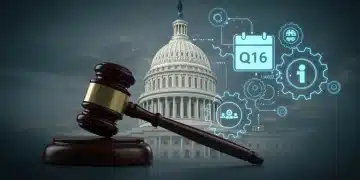Antitrust Lawsuit Against Tech Giant: Impact on Competition

A recent antitrust lawsuit filed against a tech giant raises critical questions about market competition, potentially reshaping the industry landscape and consumer choices on a substantial scale.
The **recent developments: antitrust lawsuit filed against a tech giant** has sent ripples throughout the business world. This legal challenge could redefine the competitive landscape and impact how consumers interact with technology.
Understanding Antitrust Lawsuits
Antitrust lawsuits are legal actions taken to prevent or break up monopolies and promote fair competition in the marketplace. These lawsuits aim to protect consumers and businesses from anti-competitive practices.
Key Objectives of Antitrust Laws
Antitrust laws have several core objectives designed to foster a healthy economic environment.
- Promoting Competition: Encouraging multiple players in the market to drive innovation and lower prices.
- Preventing Monopolies: Stopping single entities from controlling entire sectors.
- Protecting Consumers: Ensuring fair prices and diverse choices.
Common Antitrust Violations
Companies face antitrust scrutiny for various violations.
- Price Fixing: Colluding with competitors to set prices.
- Market Allocation: Agreeing to divide territories or customers.
- Predatory Pricing: Selling products below cost to eliminate competitors.
Ultimately, antitrust lawsuits serve as a crucial mechanism for maintaining a level playing field in the business world, ensuring that no single entity can stifle innovation or dominate the market unfairly. The complexities of these cases often require extensive investigation and expert analysis to determine the true impact on competition.

The Allegations Against the Tech Giant
The specific allegations in this antitrust lawsuit against the tech giant remain at the heart of the matter, outlining the alleged anti-competitive behaviors that have prompted legal action.
One of the primary accusations often involves the leveraging of market dominance to stifle competition. This can manifest in several ways, such as:
- Exclusive Agreements: Forcing partners into deals that prevent them from working with rivals.
- Bundling Products: Tying different products together to disadvantage competitors.
- Acquisition of Competitors: Buying out emerging threats to eliminate competition.
Impact on Innovation
Allegedly, the tech giant’s actions have hindered innovation by preventing smaller companies from entering the market or scaling their operations. This suppression of competition can lead to:
- Reduced Investment: Less incentive for companies to invest in new technologies.
- Slower Development: Slower pace of innovation due to lack of competitive pressure.
- Limited Choices: Fewer options for consumers as innovative products are stifled.
These anti-competitive practices not only harm other businesses but also ultimately hurt consumers by limiting their choices and potentially inflating prices. The lawsuit aims to address these issues by forcing the tech giant to change its behavior and create a more equitable marketplace.
Potential Outcomes of the Lawsuit
The potential outcomes of the antitrust lawsuit against the tech giant vary widely, each with significant implications for the company and the broader market.
One possible result is a settlement, where the tech giant agrees to change certain practices without admitting guilt. This could involve:
- Altering Business Practices: Modifying how the company interacts with competitors and partners.
- Paying Fines: Financial penalties to compensate for alleged anti-competitive behavior.
- Divestitures: Selling off parts of the business to reduce market dominance.
Long-Term Effects on Competition
Regardless of the specific outcome, the lawsuit has the potential to reshape the competitive landscape. This could lead to:
- Increased Competition: Creating opportunities for smaller companies to thrive.
- Greater Innovation: Encouraging new ideas and technologies to emerge.
- Better Consumer Choices: Providing consumers with more options and fairer prices.
The lawsuit’s impact extends beyond just the tech giant; it could set a precedent for how antitrust laws are applied to other dominant companies in the digital age. This makes the case a pivotal moment for the future of competition in the tech industry.

The Role of Regulatory Bodies
Regulatory bodies play a crucial role in overseeing and enforcing antitrust laws, ensuring fair competition in the marketplace. These agencies monitor business practices and investigate potential violations.
In the United States, the primary regulatory bodies include:
- Federal Trade Commission (FTC): Responsible for preventing unfair methods of competition.
- Department of Justice (DOJ): Enforces antitrust laws through legal action.
Investigative Powers
These agencies have broad investigative powers, including:
- Issuing Subpoenas: Requiring companies to provide documents and testimony.
- Conducting Market Studies: Analyzing market dynamics to identify potential issues.
- Filing Lawsuits: Taking legal action against companies that violate antitrust laws.
The work of regulatory bodies is essential for maintaining a competitive environment and protecting consumers from anti-competitive practices. Their actions can have a significant impact on the behavior of companies and the structure of entire industries.
Expert Opinions and Analysis
Experts in antitrust law and economics offer valuable insights into the recent lawsuit, providing a nuanced understanding of the potential impacts and legal challenges. Their analysis often highlights key aspects of the case.
Legal experts emphasize the complexities of proving anti-competitive behavior, noting that:
- Market Definition: Defining the relevant market is crucial for demonstrating dominance.
- Evidence of Harm: Showing that the alleged practices have harmed competition and consumers is essential.
- Intent: Proving that the company intended to stifle competition can strengthen the case.
Economic Perspectives
Economists focus on the economic effects of the lawsuit, examining:
- Market Concentration: How the lawsuit may alter the concentration of market power.
- Consumer Welfare: The potential benefits or costs to consumers as a result of the case.
- Innovation Incentives: How the outcome could impact incentives for companies to innovate.
Their combined expertise provides a comprehensive view of the lawsuit’s implications, helping to inform policymakers, businesses, and the public about the broader economic and legal ramifications.
The Broader Impact on the Tech Industry
The antitrust lawsuit against the tech giant extends far beyond the immediate parties involved, potentially reshaping the entire tech industry and influencing future business practices.
One significant impact is the potential shift in how tech companies approach mergers and acquisitions. The lawsuit may prompt:
- Increased Scrutiny: Regulators will likely scrutinize proposed mergers more closely.
- Higher Barriers: Companies may face higher hurdles in getting deals approved.
- Strategic Rethinking: Businesses may need to rethink their acquisition strategies.
Ripple Effects
The lawsuit could also lead to broader changes in the tech industry, such as:
- Greater Transparency: Increased pressure for companies to be transparent about their business practices.
- More Regulation: Calls for new regulations to address the unique challenges of the digital age.
- New Business Models: Exploration of alternative business models that promote competition.
Ultimately, the lawsuit serves as a critical test case for how antitrust laws are applied to the tech industry, potentially setting a new course for competition and innovation.
| Key Point | Brief Description |
|---|---|
| ⚖️ Antitrust Lawsuits | Aim to prevent monopolies and promote fair competition. |
| 🎯 Allegations | Accusations include stifling competition through exclusive agreements and bundling. |
| 🔮 Potential Outcomes | Settlements, fines, and changes in business practices are possible. |
| 🌐 Industry Impact | May lead to greater scrutiny of mergers and calls for more regulation. |
Frequently Asked Questions
▼
An antitrust lawsuit is a legal action taken to prevent or break up monopolies and promote fair competition in the marketplace, ensuring a level playing field for businesses.
▼
Common violations include price fixing, market allocation, and predatory pricing, which harm competition and can lead to legal action against the offending companies.
▼
Potential outcomes include settlements, fines, altering business practices, and even divestitures, all aimed at restoring fair competition to the market.
▼
The Federal Trade Commission (FTC) and the Department of Justice (DOJ) are the primary regulatory bodies responsible for overseeing and enforcing antitrust laws in the US.
▼
This lawsuit could lead to increased scrutiny of mergers, calls for new regulations, and the exploration of alternative business models that promote competition in the tech industry.
Conclusion
The antitrust lawsuit against the tech giant represents a pivotal moment for competition in the digital age, potentially reshaping industry practices and setting precedents for future regulatory actions. Its outcome will likely have far-reaching implications for businesses and consumers alike.





